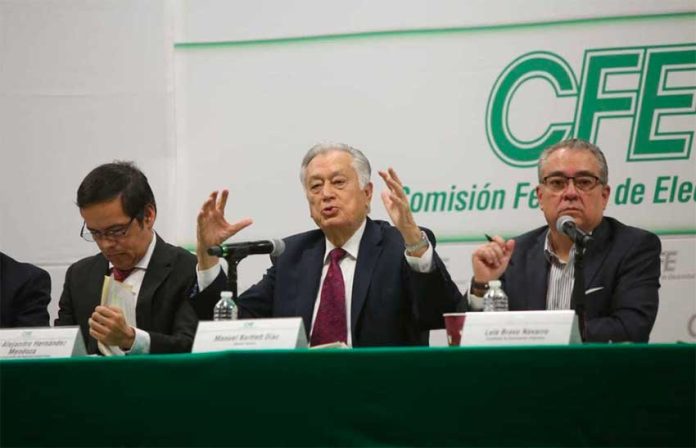The Federal Electricity Commission (CFE) has denied that a shortage of gas caused two recent blackouts on the Yucatán peninsula, reiterating that the outages were due to fires.
CFE chief Manuel Bartlett ruled out further interruptions to electricity supply, stating that there is sufficient natural gas to generate the power needed for the peninsula.
“A [gas] shortage and blackouts are definitely not in sight,” he said.
Bartlett explained that the CFE continues to work closely with the state oil company and the National Natural Gas Control Center (Cenagas) to ensure that adequate gas supply is maintained to Mexico’s southeast.
Even during the spike in demand for electricity during summer, there will be sufficient generation capacity, he said.
Guillermo García Alcocer, president of the Energy Regulatory Commission (CRE), said Wednesday that the south of the country is at risk of suffering gas and electricity shortages due to a lack of infrastructure, while energy sector expert Edgar Ocampo Telléz said earlier this week that the real cause of the blackouts on the Yucatán peninsula was a lack of gas to generate power.
Ocampo said that it was “ridiculous” to say that fires were the cause of the power outages “because fires have always occurred on the Yucatán peninsula and blackouts haven’t occurred.”
But Noé Peña, director general of the CFE transmission division, said the blackout last week and another last month were caused by the burning of sugar cane fields.
He explained that there are sugar cane plantations beneath 55 kilometers of transmission lines on the peninsula, adding that CFE personnel had met with more than 100 growers and reached an agreement so that the latter carry out future harvests without first burning their crops.
At his morning press conference yesterday, President López Obrador also said that fires were to blame for the blackouts but raised the possibility that they were deliberately lit to sabotage the transmission lines.
“There have been blackouts in the southeast and they are being investigated because it could have been sabotage . . .” he said.
“We can’t rule it out because the two blackouts have been related to fires in the same place,” López Obrador added.
Bartlett agreed with the president that transmission lines could have been deliberately damaged and said that security was being strengthened to ensure that the lines are permanently protected.
The CFE also announced yesterday that it is investing 2 billion pesos (US $106.5 million) to strengthen the electricity-carrying capacity of transmission lines between Ticul, Yucatán, and Escárcega, Campeche.
Peña said the project will be undertaken in two stages. The first, which is already under way, will be completed in May next year and the second will finish a year later.
The aim is to “double the capacity . . . of that route. We’re working on a double [transmission] line . . .” he said.
“What we’re doing is changing the conductors, technically they’re called high-temperature conductors. With the same structures, we’re going to give greater energy transfer capacity to the southeast [of the country] . . . It will give us greater [power] reliability . . .” Peña explained.
A new transformer bank will also be installed in Escárcega, he said.
The CFE supplies electricity to almost two million consumers on the Yucatán peninsula, of whom more than 1.6 million in Yucatán, Quintana Roo and Campeche were affected by the April 5 blackout, which lasted for more than three hours.
Michel Salum, president of the Mérida Chamber of Commerce and Tourism Services, said that at least 20,000 businesses were among the CFE customers that lost power, causing losses in the millions of pesos.
Source: Milenio (sp), El Financiero (sp), El Universal (sp)
